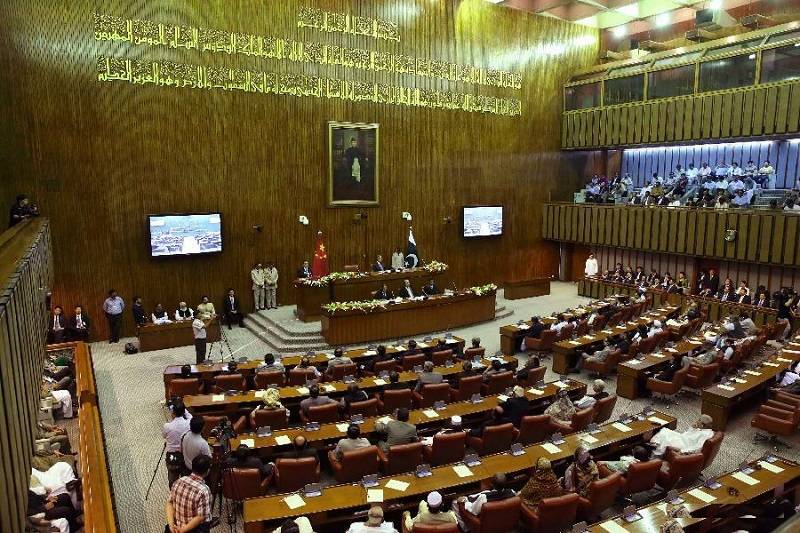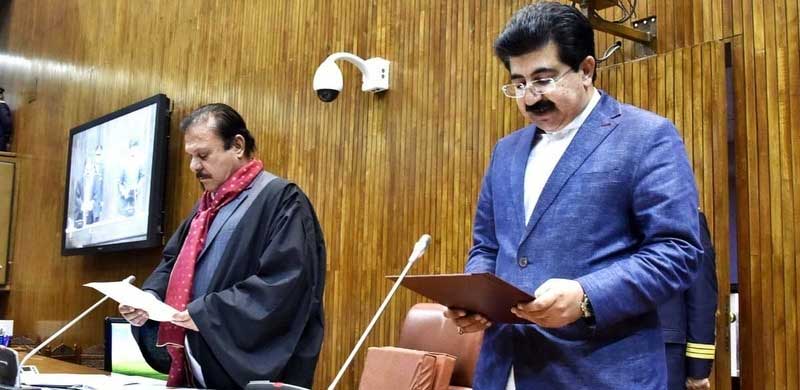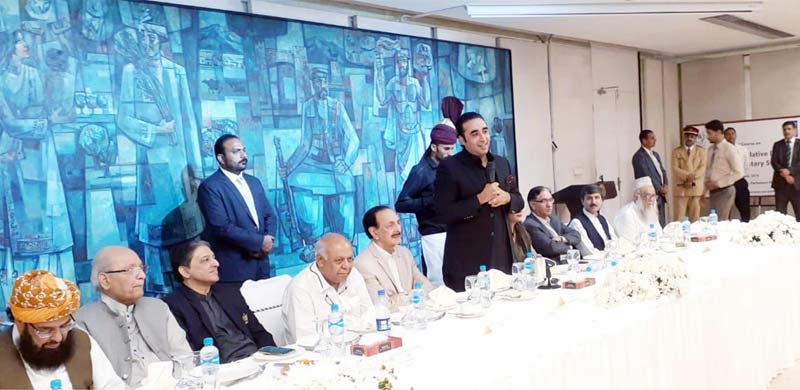
The recent Pakistan Senate Chairman and Deputy Chairman election was closely followed by South Asian observers due to the possible repercussions it posed for the survival of the incumbent regime. Did seven PDM senators really made the same mistake twice or they betrayed their respective party leaderships. If they did, what should be the repurcussions to deter this in future considering its stakes in democratic consolidation.
A total of 98 senators voted through secret ballot in the election for Senate Chairman and Deputy Chairman; 47 senators belonged to the Pakistan Threek-e-Insaf (PTI) while the combined opposition alliance known as the Pakistan Democratic Movement (PDM) had a presence of 51 senators. The incumbent Senate Chairman Sadiq Sanjrani was put up for re-election by the government coalition against the PDM candidate Syed Yousuf Raza Gilani. As for the position of Deputy Chairman the government coalition fielded Mirza Muhammad Afridi versus the PDM’s Molana Abdul Ghafoor Haideri. If all 98 senators had voted solely on partisan lines based on the instructions of their respective party high commands, the election outcome would have resulted in a capture of the Senate leadership for the PDM given its numerical majority however, this was not the case.
Sanjrani managed to retain the Senate Chairmanship with 48 votes against 42 votes for Gilani; the remaining 8 votes were rejected by the Presiding Officer Syed Muzaffar Hussain Shah. 1 out of the 8 rejected ballot papers had a stamp placed almost equally divided in the boxes of both candidates thus no objections from either candidate was raised over its rejection. As for the other 7 rejected ballot papers the stamp was placed in the box of Gilani but on the name of the candidate in contrast to what is mandated by the voting regulations. This caused an eruption of a heated debate in the senate between Gilani’s polling agent Farook Naek and Sanjrani’s polling agent Mohsin Aziz. Farook Naek argued that according to the voting instructions displayed near the polling booth written in Urdu the stamp must be affixed in the box of the voter’s favoured candidate. It did not indicate where in the box the stamp should be placed. The presiding officer decided to accept the counter-argument of Mohsin Aziz who read out from a circular also written in Urdu that clearly indicated that the voter should stamp in front of the name of the voter’s favoured candidate. Farook Naek reacted to this counter-argument by propounding “why should the voter suffer for the mistake of the secretariat?”
Amongst the key red flags that emerged here; why these 7 rejected votes were only the ones in the box of Gilani and not Sanjrani. If the voting instructions were contradictory or unclear then why the voters of Sanjrani did not make a similar mistake? Was this a genuine technical error on the side of the electors or was this done in bad faith? Were these 7 senators instructed collectively? At this juncture, one may still give the benefit of doubt to these 7 senators until the election of Deputy Chairman was conducted. After the hullabaloo over the Senate Chairman election the voting instructions had then been made explicitly clear in the Senate chamber leaving no senator with a valid reason not to know how voting was supposed to be carried out. The results of the Deputy Chairman election tallied 54 votes for the government’s candidate Mirza Muhammad Afridi vis-à-vis 44 votes for Molana Abdul Ghafoor Haideri representing the PDM.
This shows 7 out of 51 PDM Senators betrayed their party high command in support of the government. The strongest possible causal explanation of this betrayal seems to point towards the likelihood of monetary gratification in exchange of votes for the government candidates. In an interview on “Hum News”, Interior Minister Sheikh Rasheed Ahmad revealed that he was of the view that cash was involved in the Senate leadership elections. Sheikh Rasheed said that the PDM’s losing candidate for Senate Deputy Chairman Molana Abdul Ghafoor Haideri was like a “fakir” (mendicant saint). According to Sheikh Rasheed, he told Molana Abdul Ghafoor Haideri that “I don’t see your matter being solved, please increase your rate!” This is a bizarre phenomenon that the Interior Minister of an incumbent government would uninhibitedly claim on national television that monetary gratification was used to buy over the votes of opposition Senators for its Senate Deputy Chairman candidate while mocking the opposition candidate for not being able to do so.
It is important to recall that hours before the Senate Chairman election was conducted, spy cameras around the ballot box had been found in the Senate chamber though it remains a mystery who installed those cameras with the intent of compromising the secrecy of the ballot. Assuming that the mastermind behind the spy cameras and the instructor of the 7 Senators was the same entity, we can understand why these 7 senators voted in the manner they did in the Senate Chairman election instead of directly stamping in the box of Sanjrani. The spy cameras seems to be meant for ensuring that Senators from the government benches remained loyal to party lines while not implicating the 7 PDM Senators who were probably bought over to betray their high command; even though the spy cameras were removed the instructions given to these 7 Senators stayed unchanged.
The leadership of the PDM should not let the betrayal of these 7 Senators go unpunished. I would like to suggest to the Central Executive Committee (CEC) of the PDM that they should appoint foreign experts to conduct a polygraph test and interviews with behavioural psychologist of all 51 of their Senators to identify these 7 traitors and expel them immediately.
At the moment, the 7 rejected ballot papers stamped on the name of Gilani are still not entirely wasted until the Islamabad High Court (IHC) announces its verdict in response to the petition filed by Gilani challenging the decision of the Presiding Officer. The IHC has scheduled 24 March to hear the case. There is a fair chance that the IHC may declare the seven rejected votes in favour of Gilani thus declaring him Senate Chairman. This matter will eventually reach the Supreme Court of Pakistan as the aggrieved party in the IHC verdict would likely appeal against the judgement.
The PDM should temporarily put aside its differences with the PTI government and accept Prime Minister Imran Khan’s proposal to work together to introduce election reforms in Pakistan such as abolishing the secret ballot used in Senate election. The massive corruption involved in the Pakistan Senate elections as alleged by Imran Khan must be put to a stop as it tarnishes the image of the civilian political elite in the eyes of common citizens causing them to lose support for democratisation in Pakistan.
A total of 98 senators voted through secret ballot in the election for Senate Chairman and Deputy Chairman; 47 senators belonged to the Pakistan Threek-e-Insaf (PTI) while the combined opposition alliance known as the Pakistan Democratic Movement (PDM) had a presence of 51 senators. The incumbent Senate Chairman Sadiq Sanjrani was put up for re-election by the government coalition against the PDM candidate Syed Yousuf Raza Gilani. As for the position of Deputy Chairman the government coalition fielded Mirza Muhammad Afridi versus the PDM’s Molana Abdul Ghafoor Haideri. If all 98 senators had voted solely on partisan lines based on the instructions of their respective party high commands, the election outcome would have resulted in a capture of the Senate leadership for the PDM given its numerical majority however, this was not the case.
Sanjrani managed to retain the Senate Chairmanship with 48 votes against 42 votes for Gilani; the remaining 8 votes were rejected by the Presiding Officer Syed Muzaffar Hussain Shah. 1 out of the 8 rejected ballot papers had a stamp placed almost equally divided in the boxes of both candidates thus no objections from either candidate was raised over its rejection. As for the other 7 rejected ballot papers the stamp was placed in the box of Gilani but on the name of the candidate in contrast to what is mandated by the voting regulations. This caused an eruption of a heated debate in the senate between Gilani’s polling agent Farook Naek and Sanjrani’s polling agent Mohsin Aziz. Farook Naek argued that according to the voting instructions displayed near the polling booth written in Urdu the stamp must be affixed in the box of the voter’s favoured candidate. It did not indicate where in the box the stamp should be placed. The presiding officer decided to accept the counter-argument of Mohsin Aziz who read out from a circular also written in Urdu that clearly indicated that the voter should stamp in front of the name of the voter’s favoured candidate. Farook Naek reacted to this counter-argument by propounding “why should the voter suffer for the mistake of the secretariat?”

Amongst the key red flags that emerged here; why these 7 rejected votes were only the ones in the box of Gilani and not Sanjrani. If the voting instructions were contradictory or unclear then why the voters of Sanjrani did not make a similar mistake? Was this a genuine technical error on the side of the electors or was this done in bad faith? Were these 7 senators instructed collectively? At this juncture, one may still give the benefit of doubt to these 7 senators until the election of Deputy Chairman was conducted. After the hullabaloo over the Senate Chairman election the voting instructions had then been made explicitly clear in the Senate chamber leaving no senator with a valid reason not to know how voting was supposed to be carried out. The results of the Deputy Chairman election tallied 54 votes for the government’s candidate Mirza Muhammad Afridi vis-à-vis 44 votes for Molana Abdul Ghafoor Haideri representing the PDM.
This shows 7 out of 51 PDM Senators betrayed their party high command in support of the government. The strongest possible causal explanation of this betrayal seems to point towards the likelihood of monetary gratification in exchange of votes for the government candidates. In an interview on “Hum News”, Interior Minister Sheikh Rasheed Ahmad revealed that he was of the view that cash was involved in the Senate leadership elections. Sheikh Rasheed said that the PDM’s losing candidate for Senate Deputy Chairman Molana Abdul Ghafoor Haideri was like a “fakir” (mendicant saint). According to Sheikh Rasheed, he told Molana Abdul Ghafoor Haideri that “I don’t see your matter being solved, please increase your rate!” This is a bizarre phenomenon that the Interior Minister of an incumbent government would uninhibitedly claim on national television that monetary gratification was used to buy over the votes of opposition Senators for its Senate Deputy Chairman candidate while mocking the opposition candidate for not being able to do so.
It is important to recall that hours before the Senate Chairman election was conducted, spy cameras around the ballot box had been found in the Senate chamber though it remains a mystery who installed those cameras with the intent of compromising the secrecy of the ballot. Assuming that the mastermind behind the spy cameras and the instructor of the 7 Senators was the same entity, we can understand why these 7 senators voted in the manner they did in the Senate Chairman election instead of directly stamping in the box of Sanjrani. The spy cameras seems to be meant for ensuring that Senators from the government benches remained loyal to party lines while not implicating the 7 PDM Senators who were probably bought over to betray their high command; even though the spy cameras were removed the instructions given to these 7 Senators stayed unchanged.

The leadership of the PDM should not let the betrayal of these 7 Senators go unpunished. I would like to suggest to the Central Executive Committee (CEC) of the PDM that they should appoint foreign experts to conduct a polygraph test and interviews with behavioural psychologist of all 51 of their Senators to identify these 7 traitors and expel them immediately.
At the moment, the 7 rejected ballot papers stamped on the name of Gilani are still not entirely wasted until the Islamabad High Court (IHC) announces its verdict in response to the petition filed by Gilani challenging the decision of the Presiding Officer. The IHC has scheduled 24 March to hear the case. There is a fair chance that the IHC may declare the seven rejected votes in favour of Gilani thus declaring him Senate Chairman. This matter will eventually reach the Supreme Court of Pakistan as the aggrieved party in the IHC verdict would likely appeal against the judgement.
Senate Chairman Sadiq Sanjrani and Deputy Chairman Mirza Muhammad Afridi are probably well aware by now that they could be overthrown anytime either by a judicial verdict or through a motion of no-confidence whereby the veil of secret ballot would be lifted thus triggering another round of election for the Senate leadership. This major setback for the PDM is also a taste of its own medicine given the cross-voting that was involved in the election of Syed Yousuf Raza Gilani on a general seat representing Islamabad in the Senate.
The PDM should temporarily put aside its differences with the PTI government and accept Prime Minister Imran Khan’s proposal to work together to introduce election reforms in Pakistan such as abolishing the secret ballot used in Senate election. The massive corruption involved in the Pakistan Senate elections as alleged by Imran Khan must be put to a stop as it tarnishes the image of the civilian political elite in the eyes of common citizens causing them to lose support for democratisation in Pakistan.
